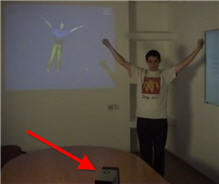update

The Nintendo Wii is big because it lets you move things on your screen with gestures of your hand, using a motion-sensitive paddle. But that’s nothing compared with what’s coming: controlling the screen with nothing in your hand at all. One day, very soon, you’ll be able to control an avatar or character on a screen with a mere gesture of your hands or body.
[aditude-amp id="flyingcarpet" targeting='{"env":"staging","page_type":"article","post_id":65690,"post_type":"story","post_chan":"none","tags":null,"ai":false,"category":"none","all_categories":"business,","session":"D"}']A range of companies are working on this dream, but few seem to be succeeding. They’re often hyped and fail to live up to their promise. We wrote about Softkinetic a year ago (it has a very cool demo), but the company hasn’t released any news since last year, and its CEO has since moved on. At that time, Softkinetic demonstrated the product to us, but in a very controlled lighting environment, and they wouldn’t let us personally try it out. From what we saw, though, we were impressed.
AI Weekly
The must-read newsletter for AI and Big Data industry written by Khari Johnson, Kyle Wiggers, and Seth Colaner.
Included with VentureBeat Insider and VentureBeat VIP memberships.
3DV says it will ship its camera and a game that works with it for less than $100, and will put you in the game so you can fly an airplane with your hand gestures, and then use finger gestures to go higher, bank, or begin shooting (lift your thumb and press down on an imaginary joystick). Very much like Softkinetic, the camera measures the distance of the object (your hand and body) from the camera on a real-time basis, calculating it for each pixel in the frame. It uses infrared and image sensors too, which depend on regular light. That lighting is what has limited the effectiveness of the technology so far, because varied lighting can create distortion.
Unlike Softkinetic, 3DV apparently has some high-profile venture capital backing. It is 62 percent owned by Israeli company Elron — at least it was a year ago. That’s when the company announced it had signed an agreement with Silicon Valley venture firm Kleiner Perkins and Pitango for a $15 million investment. But at the time, Elron said the investment was contingent on certain conditions being met. The firms are noted as investors on the company’s web site, so we assume the investment was made (Update: Kleiner Perkins has since confirmed an investment, but not an amount).
[aditude-amp id="medium1" targeting='{"env":"staging","page_type":"article","post_id":65690,"post_type":"story","post_chan":"none","tags":null,"ai":false,"category":"none","all_categories":"business,","session":"D"}']
VentureBeat's mission is to be a digital town square for technical decision-makers to gain knowledge about transformative enterprise technology and transact. Learn More
